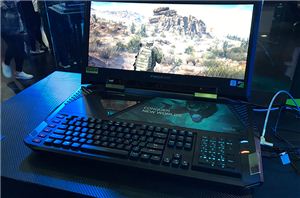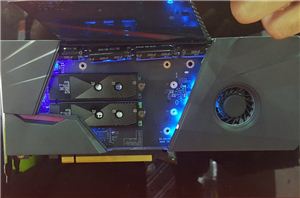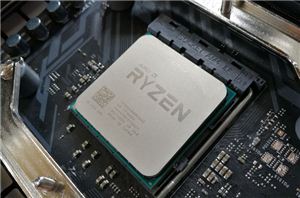Realtek Demonstrates RTD2173 DisplayPort 1.4 to HDMI 2.1 Converter
by Anton Shilov on June 13, 2019 12:00 PM EST- Posted in
- Monitors
- Displays
- HDMI
- Trade Shows
- Realtek
- HDMI 2.1
- Computex 2019

Realtek is working on a chip that will convert DisplayPort 1.4 signals to HDMI 2.1 signals. The RTD2173 converter will enable makers of notebooks, motherboards, docks, and other applications to build devices supporting next-gen HDMI output using current-generation graphics processors that only support DisplayPort 1.4 outputs. Meanwhile, such products will have certain peculiarities.
A number of modern high-end televisions featuring an 8K resolution are outfitted with HDMI ports that are technically ready to receive HDMI 2.1 signals, but are not marketed as HDMI 2.1 because they have not been certified by the HDMI Forum. Once the certification program for HDMI 2.1 is available, producers of Ultra-HD TVs can validate their devices and issue appropriate firmware updates to formally add HDMI 2.1 support. Makers of HDMI cables will release their Ultra High Speed HDMI (48G) cables around the same time.
Meanwhile, at present there are no GPUs that support HDMI 2.1 connection, and even Intel’s 10th Gen Core processors codenamed Ice Lake never mention support for this standard. Therefore, to connect an 8K TV featuring an HDMI 2.1 interface to PCs (or other applications featuring a DP 1.4) special converters or adapters will be needed. This is where Realtek’s RTD2173 chips comes into play.
The RTD2173 chip converts DisplayPort 1.4 signals to HDMI 2.1 signals to enable up to 3840×2160@240 Hz or 7680×4320@60 Hz resolution using a single cable. Keep in mind that the maximum bandwidth supported by a DP1.4 interconnection using the HBR3 data rates is 32.4 Gbps, which is enough for 8Kp60 when Display Stream Compression 1.2 is used. Meanwhile, the maximum bandwidth of HDMI 2.1 is 48 Gbps and it does not need to use DSC 1.2 for 8Kp60.
Realtek’s RTD2173 converter has been implemented in silicon and once it receives certification from the HDMI Forum, it can be used by makers of PCs, dongles, docks, adapters, cables, and other products. Expects devices with HDMI 2.1 output to be available in the coming quarters.
| Want to keep up to date with all of our Computex 2019 Coverage? | ||||||
 Laptops |
 Hardware |
 Chips |
||||
| Follow AnandTech's breaking news here! | ||||||












31 Comments
View All Comments
jeremyshaw - Thursday, June 13, 2019 - link
Are than any DP1.4 outputs (outside of the new Navi 5700) that support DSC? Does this allow for VESA Adaptive Sync --> HDMI VRR?JasonAT - Thursday, June 13, 2019 - link
nVidia RTX & AMD Navy 5700 series both support DP1.4a with DSC 1.2.repoman27 - Thursday, June 13, 2019 - link
And Intel will be in the mix with Ice Lake, so the full list goes:NVIDIA Turing: DisplayPort 1.4a, HBR3, DSC 1.2, HDMI 2.0b, HDCP 2.2
AMD Navi: DisplayPort 1.4a, HBR3, DSC 1.2a, HDMI 2.0b, HDCP 2.2
Intel Gen11: DisplayPort 1.4, HBR3, DSC 1.1, HDMI 2.0b, HDCP 2.2
Looks like each vendor will have a slightly different version of DSC this time around. That should make things fun for end users.
JasonAT - Thursday, June 13, 2019 - link
It's a freaking mess. Please for the love of god just release HDMI 2.1 GPUs already.FXi - Friday, June 14, 2019 - link
Seriously - get 2.1 products on the shelves people. We've waited a huge amount of time to get 4k @ 120 or better.wrkingclass_hero - Thursday, June 13, 2019 - link
Expect devicesSomeguyperson - Thursday, June 13, 2019 - link
Does this mean you can finally use the full 4k 120Hz VRR output of the new LG OLED TVs? I think those TVs would be much better than those "Big Format Gaming Displays" from Nvidia. The HP G Sync monitor is $4k-$5k while the 65" C9 is only $3200.JasonAT - Thursday, June 13, 2019 - link
This sounds like something that would need to be implemented on-board an AIB GPU or motherboard but if it is implemented on on an RTX/Navi 5700 series GPU with DP1.4+DSC1.2. However, this should allow 4k120 at 4:4:4 but whether you will get VRR is unknown.nathanddrews - Thursday, June 13, 2019 - link
LG's 9-series OLED supports 4K120 input and it supports FreeSync, so it's highly likely that it will work. Wait for rtings or avsforum to test it.JasonAT - Thursday, June 13, 2019 - link
Unfortunately, LG doesn't support FreeSync. It supports HDMI Forum VRR. FreeSync is AMD's derivative of VESA's Display Port Adaptive Sync which has been modified to work on HDMI as well.